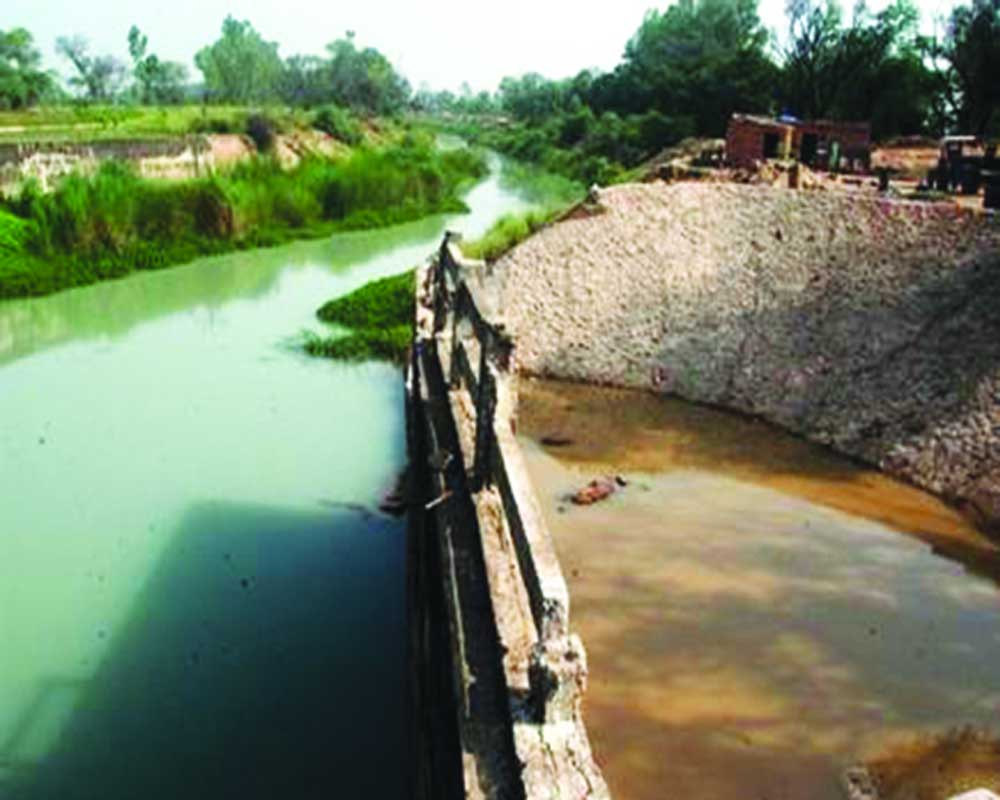Haryana CM wants earliest honouring of SC verdict to finish Sutlej-Yamuna Link canal project work
The stalemate over the Sutlej Yamuna Link (SYL) canal continues. The much-hyped meeting between the Chief Ministers of Punjab and Haryana over the politically-sensitive issue of construction of SYL canal remained inconclusive but ended with the decision of holding another round of talks to arrive at a resolution within two weeks.
Punjab Chief Minister Capt Amarinder Singh has vehemently opposed the construction of SYL canal during his video conferencing with Khattar and Union Jal Shakti Minister Gajendra Singh Shekhawat, who were present at New Delhi.
Calling SYL an “emotive issue which could disturb national security”, Capt Amarinder said Punjab is reluctant to share water with Haryana and Rajasthan, as “it has nothing to spare”.
“You have to look at the issue from the national security perspective,” he told Shekhawat during the meeting, adding, “If you decide to go ahead with SYL, Punjab will burn and it will become a national problem, with Haryana and Rajasthan also suffering the impact.”
However, Haryana Chief Minister Manohar Lal Khattar strongly advocated for the earliest honouring of the verdict of Supreme Court to complete the construction of SYL canal. He emphasised the immediate need for the creation of carrying capacity to draw the legitimate share of water allocated to Haryana.
The Tuesday’s meeting was held on the directions of the Supreme Court, which had asked the two States on July 28 to discuss the completion of the SYL canal, which is in the works for several decades, while asking the Centre to mediate between the two and submit report in the court when the matter would be taken up in the third week of August.
During the meeting, both the Chief Ministers presented their cases, and shared their suggestions to resolve the conflict, however, no final decision was taken as of now.
“For the same, the Chief Ministers have agreed to hold another meeting at Chandigarh — the joint Capital of both the States — where further details, including the legalities, would be discussed at length which would be followed by another meeting at New Delhi with the Union Jal Shakti Minister.
“Then the report of that meeting between CMs and Union Minister would be placed before the Court,” a senior Government official told The Pioneer.
The official said the Centre has to submit the report of this meeting in the apex court, but it was agreed in the meeting that the Central Government “will not submit any report to the SC on the basis of today’s meeting. And a joint meeting of the CMs of the two States will be organised again in the presence of the Union Minister within two weeks”.
Capt Amarinder urged the Centre to be cautious on the SYL issue, which had the potential to disturb the nation’s security, and reiterated the need for a Tribunal to make a fresh time-bound assessment of the water availability. At the same time, he sought complete share of water for his State from the total resource available, including from River Yamuna.
“Punjab remains at risk from all ends,” said Capt Amarinder, pointing to Pakistan’s continued attempts to foment trouble and to try and revive the separatist movement through the banned Sikhs for Justice (SFJ) organization, adding that the water issue could further destabilise the State.
“Punjab has a right to Yamuna water, in which it did not get a share at the time of 60:40 division of assets with Haryana during the State’s division in 1966,” the CM said, even as he expressed his willingness to sit across the table with his Haryana counterpart to discuss the “emotive” issue.
Putting forth Punjab’s stand during the meeting, Capt Amarinder said it is necessary to set up a Tribunal for fair adjudication of the water availability, and pointed out that the water sharing proposed by Eradi Commission was 40 years old, while international norms require a review every 25 years to ascertain the status.
Noting that there had, in fact, been no adjudication or scientific assessment of available Punjab river waters till date, the CM said Bhakra Beas Management Board (BBMB) had reported that availability of Ravi-Beas water had come down from the estimated 17.17 MAF in 1981 to 13.38 MAF in 2013.
Despite being a non-basin State and having a smaller population as well as lesser cultivated land area, Haryana’s total availability of river water stood at 12.48 MAF as against Punjab’s 12.42 MAF, he noted.
He pointed out that “trans-basin transfer of water can only be allowed from a surplus basis to a deficit basis, and, as of today, Punjab is a deficit state and could not therefore be asked to transfer water to Haryana”.
Capt Amarinder said he had taken a concerted decision to terminate all water agreements back in 2004 to save Punjab from burning, amid reports that violence could erupt in the State in protest. “The situation has aggravated since then…109 of the state’s 128 blocks have officially been declared ‘dark zones’,” he added.
Pointing to the melting glaciers, he urged the Central Government to take the climate change effects into account. The situation was likely to worsen with China constructing dams in their territory, warned Capt Amarinder, adding that this would lead to water shortage even in Satluj river.
“Why would I not agree to give water if we had it,” he said, adding that certain areas of south Haryana were, in fact, part of the erstwhile Patiala estate and he personally had special love for the region. The CM recalled that he had suggested construction of water storage dams in Himachal Pradesh for collecting water so that the flow of water into Pakistan could be checked. He urged the Union Minister to consider the suggestion.
Describing the meeting as “positive and cordial”, Capt Amarinder later said the Union Minister seemed to understand Punjab’s viewpoint.
























